 The Story: The idea came from Hollywood.
The Story: The idea came from Hollywood.Billy Wilder was watching Brief Encounter (the version directed by David Lean) and there's a scene where the two lovers rendezvous at the flat of the man's friend, who unexpectedly comes back early, and finds them there. Of the two lovers, the woman runs off, embarrassed, but the man stays and is subjected to his friend's scorn and judgment.
And Wilder stopped thinking about the two lovers in the story, and started wondering about that guy who loaned the flat to his friend and found that he was using it for a romantic liaison. Something could be made of that.
But, you couldn't do too much, because, at the time, affairs weren't supposed to happen in movies, certainly not adulterous affairs, and then only if the participants were punished for their infidelity. In that way, the Hays Code was more consistent than God.
Once restrictions for movies started to get relaxed, Wilder thought again about that scene and recalled an incident that had recently happened in Hollywood. It occurred when producer Walter Wanger shot agent Jennings Lang for supposedly having a tryst with Wanger's wife—and Lang's client—actress Joan Bennett (who publicly denied any affair). The location for the assignation was the bungalow of a lower-level employee of Lang's agency, MCA. Wilder, and his steady collaborator, I.A.L. Diamond, started writing about the moral dilemma of such an employee, who wanted to get ahead in his corporate career, and was doing so by questionable means. The two moved the location from Tinsel Town to Corporate World without having to stretch credulity in any way, as you can buy casting couches in any furniture store in the world. And power corrupts, absolute-wise.
But, it's a new year. One hopes that things will be better with a fresh start, and that roadblocks of power can be kicked in the keister to allow limitless horizons of possibility. May we all be mensches.
The Set-Up: C.C. "Bud" Baxter (Jack Lemmon) is an employee with Consolidated Life of New York, an insurance company—Ordinary Policy Department, Premium Accounting Division, Section W, desk number 861. He is a cog, machine-wise, in the works of the company, but he has one asset that makes him attractive for advancement: he's unmarried and has his own apartment. This proves invaluable in his networking as he loans out his place to married company executives so they can cheat on their wives, infidelity-wise. As he moves up the corporate ladder, he loves the perk's, but when things start to get personal—he starts to lend his key to personnel manager Jeff Sheldrake (Fred MacMurray), who is having an adulterous affair with a woman Baxter knows, Fran Kubelik (Shirley MacLaine). At this point, Baxter has quit his job, having taken care of Fran, who, despondent over how Sheldrake was treating her, had attempted suicide in his apartment, finally deciding on the higher ground, morality-wise.
It is five minutes before midnight, New Year's Eve. Sitting
alone in the last booth is Fran, a paper hat on her head, a
pensive look on her face. There are two champagne glasses on
the table, and the usual noisemakers, but the chair opposite
her is empty. Above the general hubbub, the Chinese pianist
can be heard playing.
Threading his way through the merrymakers crowding the bar
and overflowing from the booths is Sheldrake.
FRAN Ring out the old year,
SHELDRAKE
I didn't plan it this way, Fran --
actually, it's all Baxter's fault.
FRAN
He wouldn't.
The piano player is consulting the watch on his upraised
left arm. He drops the arm in a signal, and the lights go
out. At the same time, he strikes up AULD LANG SYNE.
SHELDRAKE
Happy New Year, Fran.
Sheldrake faces in the
direction of the pianist, and holding his glass aloft, sings
along with the others.
As AULD LANG SYNE comes to an end, the place explodes
noisily -- there is a din of horns, ratchets, and shouted
greetings. The lights come up again.
In the last booth, Sheldrake turns back toward Fran -
SHELDRAKE
-- where are you, Fran?
DISSOLVE TO:
EXT. BROWNSTONE HOUSE - NIGHT
Fran, a coat thrown over the dress she was wearing at the
Rickshaw, comes down the street almost at a run. There is a
happy, expectant look on her face. She hurries up the steps
of the house and through the front door.
FRAN (pounding on door)
Mr. Baxter!
The door opens and there stands Bud, the bottle of champagne
he has just uncorked still foaming over in his hand.
Fran comes in and Bud shuts the door. The room is the same
as we left it, except for an empty champagne glass standing
on the coffee table.
He goes to one of the cartons, takes out a champagne glass
wrapped in newspaper, starts to unwrap it.
FRAN
(looking around)
Where are you going?
(Bud, pouring
champagne, looks up
at her)
BUD
What about Mr. Sheldrake?
Bud cuts a card, but doesn't look at it.
She hands the deck to Bud.
Bud begins to deal, never taking his eyes off her. Fran
removes her coat, starts picking up her cards and arranging
them. Bud, a look of pure joy on his face, deals -- and
deals -- and keeps dealing.
Story-wise.
THE END
Words by Billy Wilder and I.A.L. Diamond
The Apartment is available on DVD and Blu-Ray from M-G-M Home Video.






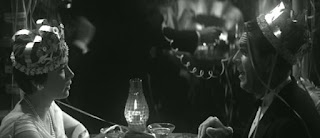





























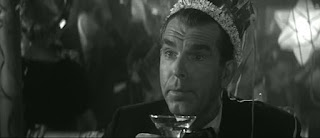







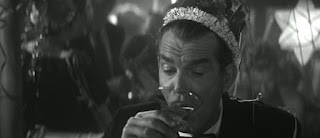


















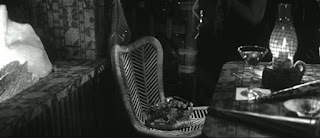



























































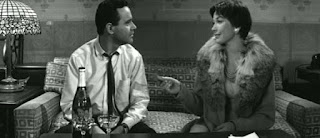







No comments:
Post a Comment